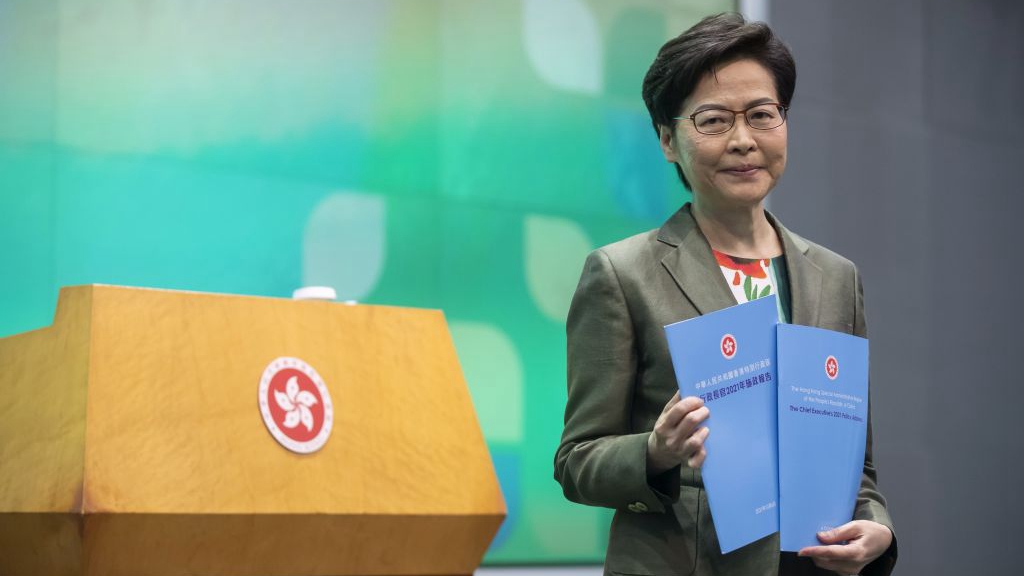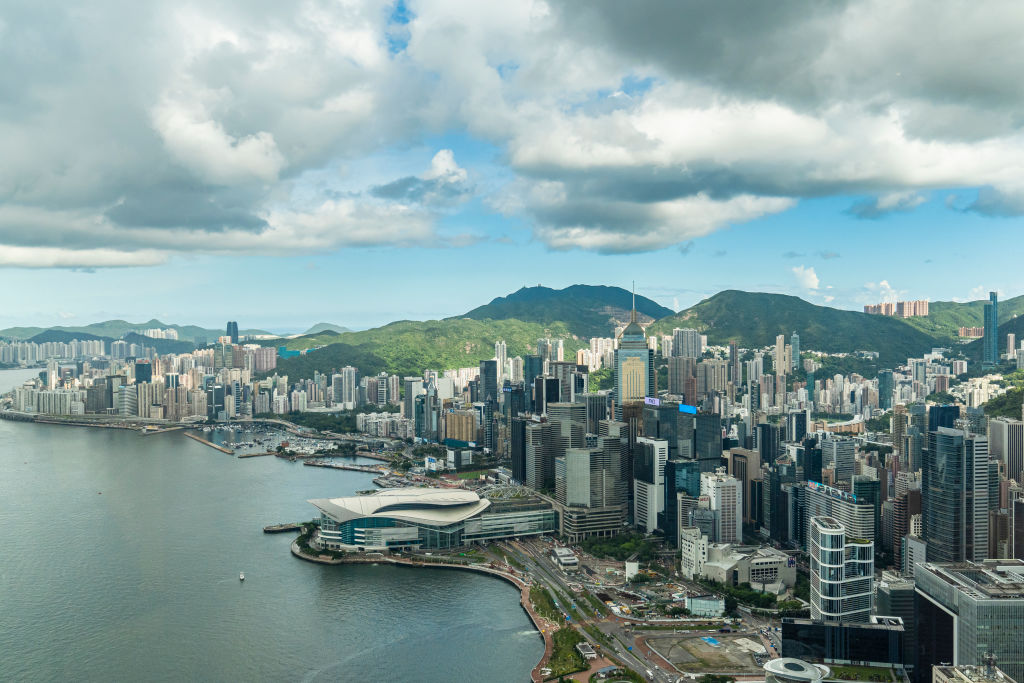
Carrie Lam, Chief Executive of the Hong Kong Special Administration Region, attends a news conference in Hong Kong, China, October 6, 2021. /Getty
Carrie Lam, Chief Executive of the Hong Kong Special Administration Region, attends a news conference in Hong Kong, China, October 6, 2021. /Getty
Editor's note: Grenville Cross, a senior counsel and professor of law, was previously the director of public prosecutions of the Hong Kong SAR. The article reflects the author's opinions and not necessarily the views of CGTN.
On October 6, 2021, Chief Executive of the Hong Kong Special Administration Region (HKSAR) Carrie Lam Cheng Yuet-ngor delivered her fifth policy address, the last of her current term of office. Entitled "New Era, New Opportunities," it set out her vision for Hong Kong and explained her policies for resolving immediate problems, such as the housing shortage.
As expected, Lam, who spoke for 140 minutes, indicated how more land for housing purposes would be made available by, for example, making it easier for New Territories villagers to sell their ancestral lands, releasing wetlands, and providing funds to acquire private land for housing.
Lam also described her plans for a "New Metropolis" in the New Territories, which will serve multiple purposes. Once developed, it will have 905,000 new housing units, and it will also facilitate Hong Kong's integration with Shenzhen and the Guangdong-Hong Kong-Macao Greater Bay Area.
In particular, the Qianhai Shenzhen-Hong Kong Modern Service Industry Cooperation Zone will greatly benefit Hong Kong, and the proposed rail link between the northern New Territories and Qianhai will facilitate the city's involvement. This, of course, will, in addition to creating jobs, assist economic integration in southern China, as envisaged by the country's 14th Five-Year Plan.
As Lam pointed out, some foreign powers have tried to harm Hong Kong, and they made full use of local proxies to create havoc in the city. Their efforts failed, however, thanks to the National Security Law for Hong Kong and the revised electoral arrangements, and thousands of foreign companies are still doing business in the city, realizing that this is the place to be as the 21st century unfolds.
This is clearly sensible, and the city's own development holds out great promise, including the mega tech hub which Lam described for the Lok Ma Chau Loop, covering 540 hectares, as well as the proposed "smart port" network.
Housing, economic integration and livelihood issues apart, security and legal issues featured heavily in the address. National security requires the early implementation of the outstanding parts of the Basic Law's Article 23, concerning the offenses of sedition, treason and theft of state secrets.
Although the National Security Law for Hong Kong covers various national security offenses, it did not purport to be comprehensive. Lam, therefore, said that the work on Article 23 will be "proactively" taken forward, and, 24 years after the reunification, no further delays can be countenanced.
As Lam explained, the Secretary for Security, Chris Tang Ping-keung, "is drawing up effective and pragmatic proposals and provisions, and formulating effective publicity programs to prevent those who are opposed to China and attempt to destabilize Hong Kong from taking advantage of the situation to mislead the public with ill intentions".
This, of course, is welcome news for everyone concerned by the attempts in 2019-20 to use Hong Kong as a base for undermining China, and for promoting seditious activities. Once Article 23 is finally implemented, there will be no more gaps in the city's defenses, and the "One Country, Two Systems" policy, which the insurgents tried to destroy, will be safe.

The skyline and buildings in the business district of Hong Kong, China, September 20, 2021. /Getty
The skyline and buildings in the business district of Hong Kong, China, September 20, 2021. /Getty
The chief executive also proposed a five-pronged strategy to further strengthen national security, and this will make the city safer. Apart from the early enactment of Article 23, this includes a review of existing legislation to ensure that the laws available to law enforcement authorities are fit for purpose.
The work on countering terrorist-type activity will also be enhanced, as also will public communication, guidance, supervision and regulation. National security education will be beefed up, and oath-taking requirements for public officers will be fully implemented.
As part of the initiatives, the Department of Justice will be playing a full role. To complement national development, it will be doing all it can to develop the city as the center for international legal and dispute resolution services in the Asia-Pacific Region.
This, for example, will involve the implementation of arrangements on reciprocal recognition and enforcement of civil and commercial judgments between Hong Kong and the Chinese mainland, as well as pursuing the feasibility of creating international dispute resolution centers in Hong Kong.
In addition, the justice department will be ensuring a proper understanding of the rule of law, by, for example, promoting its "Vision 2020 for Rule of Law" programs. These include such initiatives as rule of law seminars, a rule of law database, and the promotion of LawTech.
The department will also enhance national awareness by providing education on the Constitution, the Basic Law and the National Security Law, and doing its best to attract and retain top legal talent by, for example, relaxing qualification requirements for those who come to Hong Kong to handle commercial disputes.
As Lam pointed out, moreover, fair trials and due process are essential elements of the rule of law, and the judiciary requires every support. She therefore announced that the judiciary, which has a courtroom shortage, will be provided with a new "mega courtroom" in Wanchai Tower, which will be of great value in trials involving multiple defendants. This will see the judiciary through until the new District Court is complete, and it will also be assisted by the recommissioning of the Tsuen Wan Law Courts as of October 4.
Everybody concerned with child welfare will, moreover, have been delighted by Lam's announcement that a commissioner for children will be appointed. Once the post is created, the commissioner will be able to spearhead children's rights, and to press for the child protection laws that are so urgently required.
If a law to ensure the mandatory reporting of child abuse can be timeously enacted, this will be a huge step towards providing children with the protection they so desperately need.
Quite clearly, Lam's address was comprehensive and forward-looking. It demonstrates that Hong Kong is back in business, and is able to play its full role in national development. Those who thought they could ruin Hong Kong and harm the whole of China have been thwarted, and the future now lies in the hands of those who care for the city and wish the country well.
(If you want to contribute and have specific expertise, please contact us at opinions@cgtn.com.)

